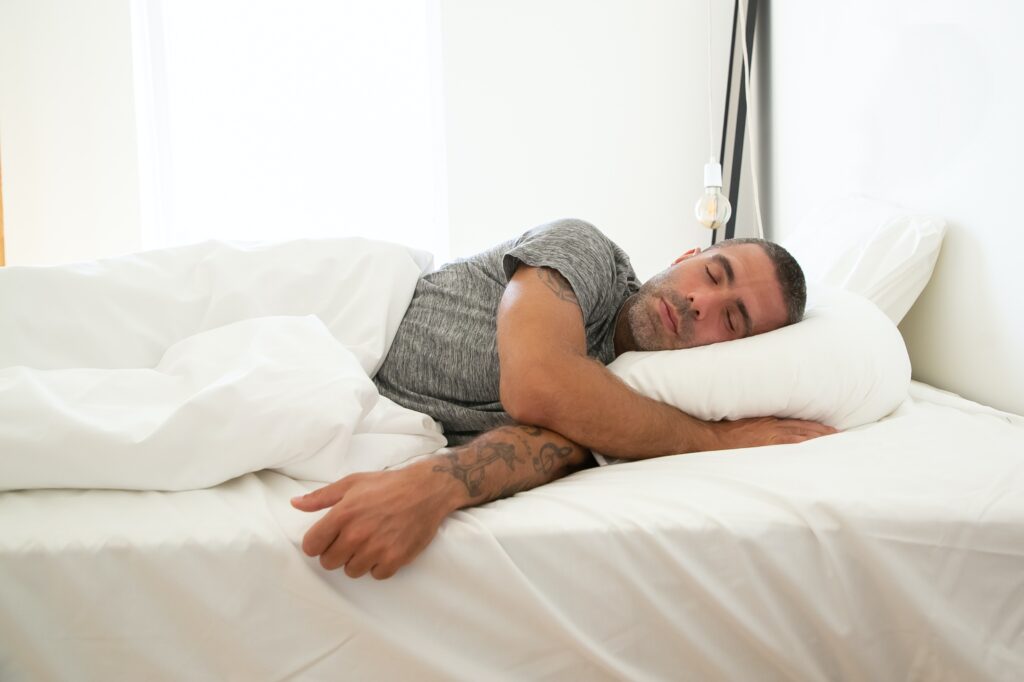Aging and sleep: What you need to know
Learn about the relationship between age and sleep, and how getting more zzzs can help prevent disease.
As we age, our sleep patterns change, but our ability to sleep shouldn’t. Your brain needs sleep to regulate your body, restore energy, and repair damage. Without a healthy amount of sleep, you’re left vulnerable to health conditions that accelerate aging and make it difficult to safely age in place.
Fast facts
- Sleep deprivation activates genes related to aging in older adults, even if it’s just one night of lost sleep.
- Regularly sleeping less than six hours per night may be linked to dementia and stroke-related brain changes as early as middle age.
- Lack of sleep may cause early onset of chronic conditions, including dementia, cardiovascular disease, osteoporosis, and diabetes.
- Research shows that older adults spend less time in deep sleep stages, are awake more often throughout the night, and feel sleepy earlier in the day.
- An estimated 46% of older adults take five or more prescription medications, which may negatively influence sleep.
How sleep works in the brain
Did you know your entire sleep pattern is run by a small yet powerful structure in your brain? The suprachiasmatic nucleus (SCN) is a dense bundle of cells located on both halves of your brain. Its primary purpose is to receive light from your eyes to guide behavioral patterns. This includes the circadian rhythm, which influences the timing of our sleep schedule.
When the SCN detects less sunlight, it tells the pineal gland in the brain to release a hormone called melatonin to induce sleep.
While you rest, your brain works in shifts throughout the night to relax and restore the body, file away memories, remove toxins, and replenish energy. It cycles between two phases: rapid eye movement (REM) and non-REM sleep.
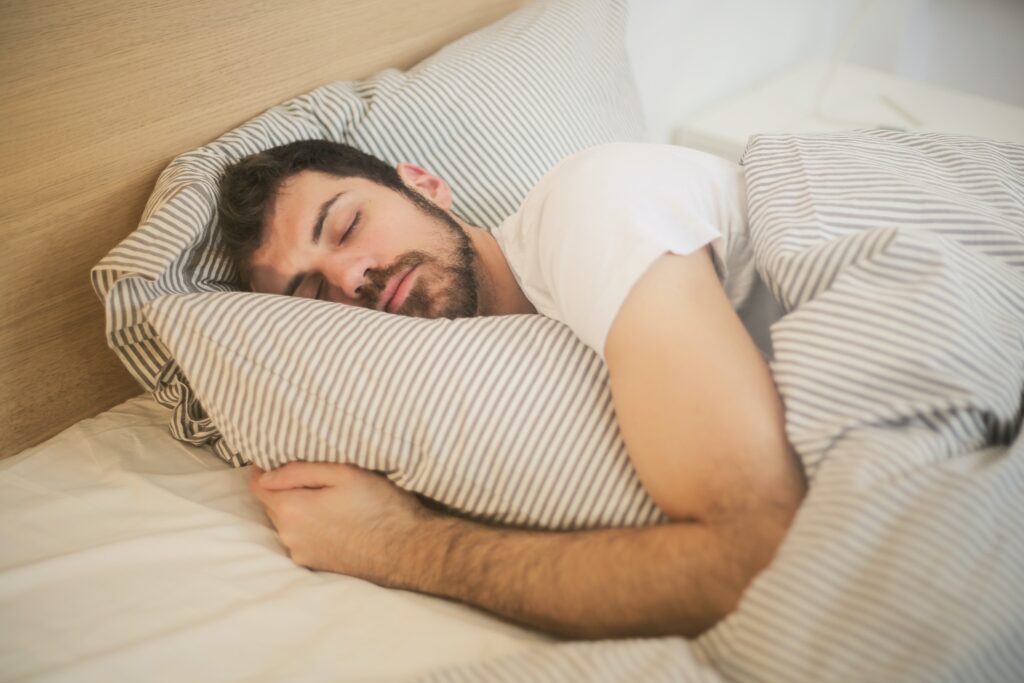
During non-REM sleep, your brain goes through three stages for approximately 90 minutes total:
- Stage one: Your brain transitions into sleep, slowing your heart and breath into a calm state.
- Stage two: Your muscles relax deeply and your vitals slow down. Body temperature drops slightly and brain waves begin to decrease.
- Stage three: You enter your deepest sleep, which occupies the most time during the first half of the night. Vitals are at their lowest, metabolism of the brain has decreased, and muscles are the most relaxed. This stage is important for body recovery and energy restoration.
Finally, you enter REM sleep. Your brain becomes active, your eyes move rapidly, and your vitals rise to near-wake levels. REM sleep is an important part of sleep for dreaming, storing memories, learning, regulating mood, and recovering the brain’s function.
During an eight-hour sleep, your brain cycles in and out of REM sleep four to five times.
How sleep changes as we age
According to research from the Yale School of Medicine, our sleep cycles and circadian rhythms are expected to change as we age.
It’s normal for older adults to experience less total sleep time, which is sometimes caused by more disruptions during sleep. You may also experience less time in stage three non-REM and REM sleep, influencing how the brain recovers, learns, and stores memories. Many older adults find that it takes longer to fall asleep initially, but getting back to sleep is usually not an issue. Research has found that the time it takes to return to sleep after waking is no longer than the time it takes for younger adults to get back to sleep.
As you age, you’ll find that your circadian rhythm shifts forward in time. This phenomenon is called phase advance and causes older adults to feel awake earlier in the morning and drowsy earlier in the evening than younger adults.
Do older people need less sleep?
No, older people don’t need less sleep. Seven hours of sleep is adequate for most older adults, but changes in sleep patterns can influence whether they get their recommended seven hours.
The impacts of sleep quality on health
Poor sleep affects physical, mental, and emotional health. Older adults who report sleep complaints (like insomnia) also report increased pain levels, impaired physical function, and a higher risk of falls, to name a few.
Sleep and physiological aging
A 2021 study summarized findings in existing literature that link sleep deficiency with accelerated aging and disease onset, including heart issues and cancer.
As we age, our body tissues naturally experience damage. Our immune system has an inflammatory response to remove these damaged cells. This process occurs more as we age, but if we can’t remove the damage efficiently, it accumulates and promotes a chronic state of inflammation. The abnormal accumulation of damaged cells and inflammation as we age is called inflammageing.
Sleep regulates the immune system and its inflammatory response, which is important in removing damaged cells. Those with sleep deficiency have a higher risk of inflammageing. Adults who reported six hours or less of sleep nightly show more accumulation of tissue damage than those who got the recommended seven hours of sleep. One study showed genetic damage in older adults after only one night of four-hour sleep, which remained despite the participants getting enough rest the following night.
Sleep and depression
Sleep and depression have a two-way relationship. A review of relevant studies showed that sleep disturbance is a major symptom of depression. But disturbed sleep, particularly during your mood-balancing REM sleep, can also be the cause of depression.
Naturally occurring age-related changes to sleep patterns leave older adults vulnerable since they spend less time in REM sleep.
Researchers agreed on the relationship between sleep and depression, but there’s no consensus on how they’re linked or how to best treat both issues. There is some evidence specific to older adults, though. Research showed that older adults with depression and insomnia benefitted from cognitive behavioral therapy for insomnia (CBT-I), with significantly fewer symptoms at the 20-week follow-up visit.
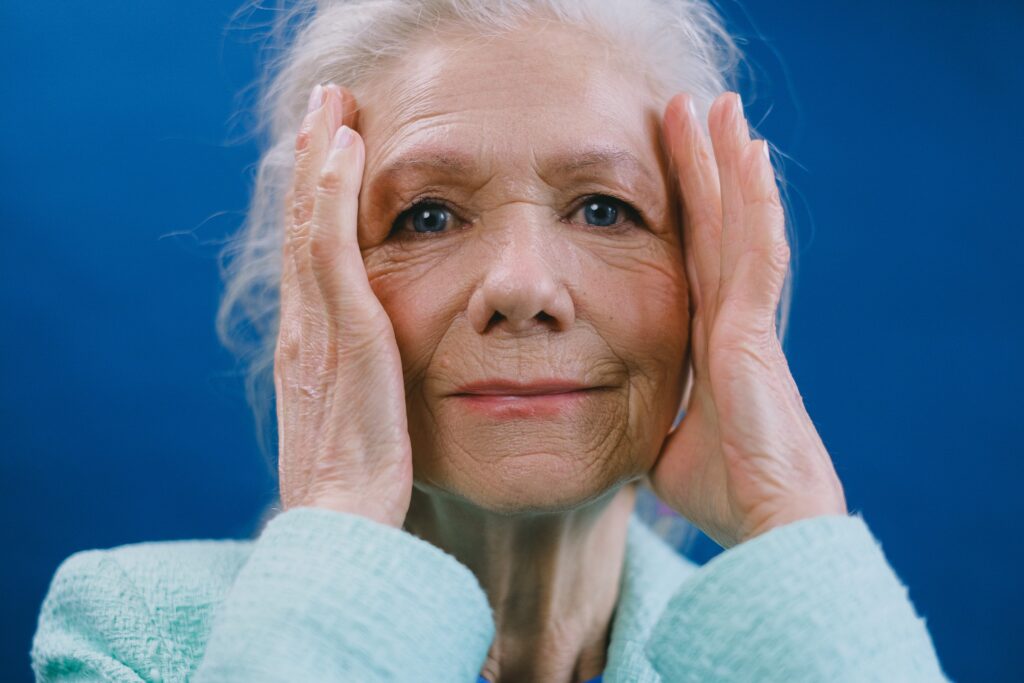
Sleep and dementia
“Disrupted sleep could increase the risk for neurodegenerative brain diseases,” warned Ann Kriebel-Gasparro, DNP, president-elect of the Gerontological Advanced Practice Nurses Association. Research has connected disturbed sleep and sleep-disordered breathing (like sleep apnea) with a higher risk for different types of dementia, a neurodegenerative condition that permanently impacts memory, thinking, and physical function. [14] Unfortunately, there is no cure for dementia, but there are disease management strategies.
Kriebel-Gasparro explained that sleep disturbance can increase beta-amyloid, a protein that accumulates in the brains of people with Alzheimer’s and dementia. Without adequate sleep, your body can’t keep up with beta-amyloid protein removal, triggering disease onset. Neurodegenerative damage can start young. Middle-aged adults who sleep less than six hours per night show changes in the brain that have been linked to declining brain health and medical conditions, like dementia or stroke.
Like sleep and depression, sleep and dementia also have a two-way relationship. The same research series stated that altered sleep patterns are a hallmark sign of dementia, possibly due to changes in parts of the brain that control the circadian rhythm. This cyclical relationship is difficult to manage, but understanding it is the first step to developing the right treatment.
Common issues impacting sleep in older adults
In an academic review on sleep disorders, three studies reported a prevalence rate between 21.3% and 34% among adults older than 60. Both old and new research shows that many factors contribute to disordered sleep, and some are more common as we age:
- Back, neck, or joint pain
- Worry, anxiety, and depression
- Neurodegenerative disorders, like dementia and Alzheimer’s
- Sleep apnea or disordered breathing at night
- Restless leg syndrome, or the urge to move your limbs often
- Nocturia, or having to urinate at night
- Stimulating medications or medication interactions
- Decreased sunlight exposure
- Decreased physical activity
Many of these factors are controllable. Dr. Kriebel-Gasparro highlighted multiple ways daytime habits can contribute to nocturia, for example. Taking diuretic medications or fluids before bedtime (alcohol, tea, coffee) can have you running to the bathroom throughout the night. Take diuretic medications first thing in the morning, not in the evening, unless otherwise prescribed. And be sure to limit fluid intake, especially diuretic beverages like the ones listed above, in the evening.
“Other medications that can keep us awake include some antidepressants, like Prozac or Celexa, and cold medications, like Sudafed,” said Dr. Kriebel-Gasparro. “Of course, checking in with your health care provider, especially a geriatrician or geriatric nurse practitioner, to discuss any problems with sleep and strategies is essential for health.”

Maximizing your sleep quality
If you notice negative changes in your sleep patterns, don’t wait to make changes until it impacts your daily life. Identify what triggers a bad night’s sleep and make small adjustments to your habits to prevent developing a sleep disorder.
Identify what triggers your sleep disturbance
Now that you know some of the common issues that influence sleep patterns, you have a better idea of what to look for. Dr. Kriebel-Gasparro recommended keeping a sleep diary to track your daily behavior and habits, including:
- Medications: Write down all prescribed and over-the-counter medications, their dosage and the exact time you take them. Supplements (including herbals) and recreational drugs count.
- Drinks: Track the amount of water, tea, coffee, soda, alcohol, and power drinks you consume daily.
- Food: Document when you ate each meal and snack, and what you ate. Specify if you ate less or more than your usual amount, or if you ate your normal full serving amount of food.
- Exercise: Keep track of your exercise schedule and how many steps you take during the day, as both can help you get better sleep.
- Bedtime: Write down when you fell asleep each night and woke up each morning. Are you an early bird or a night owl? Has this changed?
- Noticeable sleep disturbance: Document how often you wake up at night and for what reasons, such as a bathroom run or a restless bed partner.
- Stressors and traumas: Have you experienced any difficult events lately, like the death of someone close or a change in living accommodation?
If you have a family member or caregiver at home, ask them to help you fill out your diary. They may notice louder snoring or pauses in breath, which is important to document and tell your doctor about.
Many products on the market can help you track your sleep patterns and vitals at night, like the Apple Watches (watchOS 7 and newer) or the Oura Smart Ring. Some Tempur-Pedic adjustable beds pair with a mobile app to track your sleep, including when you wake up during the night, on a time-stamped dashboard. This level of tracking may not be necessary for everyone, but it can help identify difficult nights and connect them with daytime triggers, especially for those with long-term medical conditions that affect sleep quality, like sleep apnea or chronic pain.
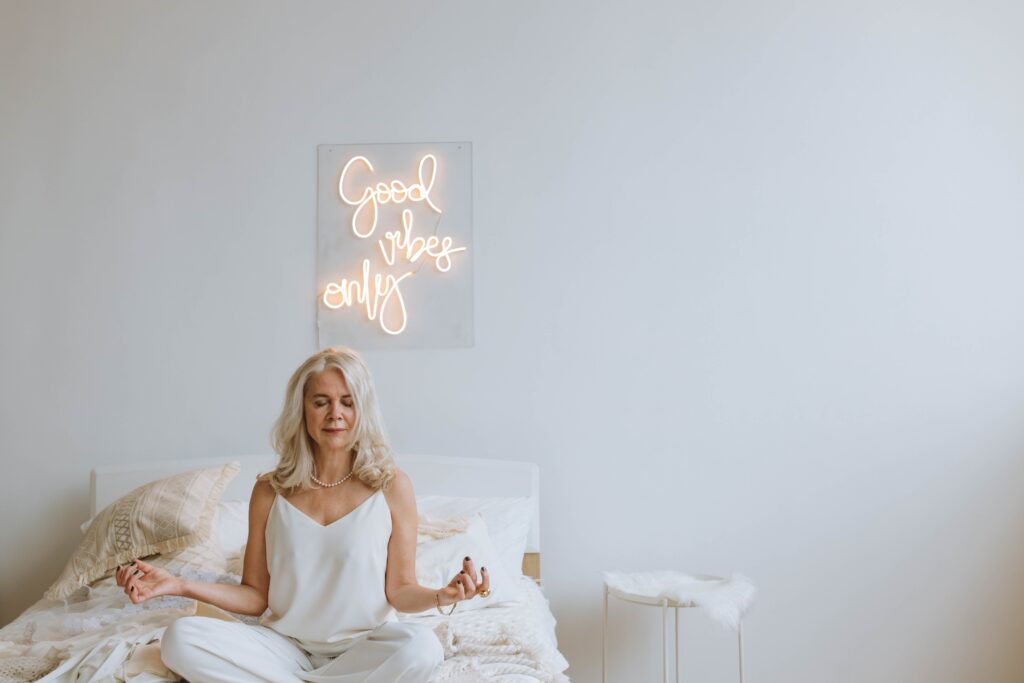
Practice good sleep hygiene
Those who practice good sleep hygiene establish daily and nightly habits that promote quality sleep. In most cases of insomnia, addressing sleep hygiene is the first approach.
We asked Dr. Kriebel-Gasparro about the advice she gives to her patients to improve their sleep. We also consulted the Journal of General and Family Medicine and the Sleep Hygiene Index (a clinical test that scores your sleep hygiene practices) to develop a comprehensive list of 10 sleep hygiene tips to address common causes of sleep disturbance in older adults:
- Establish a regular sleep schedule: Go to bed and wake up at the same time every day, and as soon as you wake up, get out of bed and start your day. Getting in and out of bed at different times daily can jumble your sleeping patterns.
- Avoid alcohol at night: Alcohol can promote sleep for some people, but you’ll be likelier to wake at night to use the bathroom. Try not to drink alcohol within four hours of bedtime.
- Avoid caffeine in the evening: Caffeine can make it difficult to fall asleep, as well as lead to more bathroom visits during the night. One study found that caffeine disrupts sleep even after six hours, so it’s best to avoid drinking coffee, tea, or soda after noon. [19]
- Eat regular meals: Schedule three meals daily with light snacks if you feel hungry, but avoid eating heavy meals before bedtime.
- Limit fluid intake before bed: If you need to use the bathroom often at night, avoid liquids before you sleep and prioritize water intake in the morning instead. If you have heart or circulation problems, talk to your doctor before implementing this practice, as it can influence these conditions.
- Stay away from electronics before bed: Watching the news or browsing social media can be stimulating, and sometimes upsetting, which will impact sleep quality. If you watch television or read during the day, avoid doing so in bed. Designate the bed for sleep, relaxing, and intimate activities only.
- Make the bedroom a quiet, relaxing area: Sleep in a dark, quiet environment with a comfortable temperature of about 75 degrees Fahrenheit. If your bed is uncomfortable, consider upgrading your bed with a better mattress or an adjustable base.
- Exercise regularly: Aerobic exercise in the morning, like walking and biking, improves the ability to fall asleep at night. But exercising to the point of sweating before bed may keep you awake.
- Get more sunshine: Your brain regulates your sleep patterns using daylight, so step outside and open your blinds during the daytime.
- Manage your worries: If your mind is racing before bed, list your to-dos to get them out of your head. You can address them in the morning when you’re well-rested. If you need more support for your racing thoughts, consider talking to a therapist who can offer solutions.
When to talk to your doctor
It’s time to talk to your doctor when your sleep habits worsen and you notice increased difficulty falling or staying asleep. It’s especially important to talk to your doctor if you notice daytime behavior changing due to poor sleep, like altered mood, mental fogginess, or feeling physically unsteady.
If you have a sleep diary or any sleep-tracking information, remember to take it with you when you see your doctor. Dr. Kriebel-Gasparro also recommended documenting any personal or family history of depression, anxiety, bipolar disorder, previous sleep disorder diagnoses, or history of brain trauma or concussion. “It is best to be honest with your provider, as they will be able to help you better if they know your history. Everything you share will be confidential,” she said.
Guidance on sleep in assisted living
We asked Lisa Ridge, a licensed practical nurse and director of clinical services at Cambridge Hills Assisted Living in Pittsboro, North Carolina, about the unique challenges older adults face sleeping in assisted living homes.
“Noise is the biggest problem,” said Ridge. “Residents with dementia might make loud noises, or yell in their sleep. Staff make noise, whether conversing among themselves or interacting with other residents.” Assisted living facilities also have scheduled checks throughout the night to ensure residents are safe, but even so, “Falls happen a lot during the night,” said Ridge.
Residents who need regular assistance for self-care may be woken up often. “For residents that are incontinent, staff checks them and changes them if needed. This will disrupt sleep, but it is necessary to protect the integrity of the [resident’s] skin.” If noise is an issue, Ridge recommended streaming white noise through a speaker into the resident’s room to soothe and drown out other sounds.
Ridge mentioned that light is also a problem. “We turn lights down in the building, but there are lights that never shut off. If you are a person who likes to sleep in complete darkness, this will be a change,” she said. If lights are bothersome, a sleep mask may help block light from your eyes while you sleep.
For many, anxiety and change in routine can be a challenge. Ridge mentioned that medications can help, but most have side effects that can increase someone’s fall risk. “Physicians are very hesitant to order them,” she said.
If you or someone you care for lives in an assisted living facility and has trouble sleeping, talk to your doctor or a staff nurse about ways to practice sleep hygiene that is specific to your setting. You may be able to create better sleeping accommodations or participate in scheduled activities during the day that will promote sleep at night, like outdoor excursions or exercise sessions.
Practice safe sleep
According to a recent analysis of more than 10,000 older adults who have fallen, 25% reported the fall occurring in the bedroom. Unfortunately, that’s the most common place to fall in the home. [20]
If you are planning to age in place, it’s a good idea to examine your home and make changes that will keep you safe, especially in your sleeping quarters. Here’s a list of ideas to consider:
- Remove tripping hazards: Declutter the bedroom and remove any obstacles that pose risk, like rugs, piles of clothes, or pet toys.
- Make sure you can see: Avoid walking in the dark at night by keeping a light within reach. And if you use glasses, keep those by your bedside and remember them when you get up.
- Install motion-activated nightlights: Keeping a light on at night is useful if you need to get up, but could disturb your sleep. Consider a motion-activated night light next to your bed instead, which only turns on when it senses your movement.
- Adjust your bed height: If your bed’s surface is too low or too high, it can impact how efficiently you are able to get up and go. This issue is pronounced in those who need to use the bathroom often through the night. The Americans with Disabilities Act (ADA) National Network states that the optimal bed height is 20–23 inches, although this may differ based on your height. [21]
- Upgrade your bed’s mobility features: Install grab bars to your bed to help you adjust or reposition yourself in bed, or rise to a seated position. If you’d like extra assistance getting out of bed, consider an adjustable base that elevates your head and feet using a remote control. You can isolate adjustments to the head, which helps you sit up with less effort.
- Keep your phone nearby and charged: Charge it every night on your nightstand and keep it within reach in case of an emergency. Resist the urge to use your phone before you sleep, though.
- Consider a medical alert device: Medical alert systems are another way to contact help if you need it. Most companies recommend charging your medical alert device at your bedside, so you can have quick access to the alert button in an emergency. It’s not a good idea to wear your medical alert in bed, as you could accidentally press the alert button and wake up to emergency personnel in your room. Instead, opt for a GetSafe device package, which includes a voice-activated wall button that can hear you from anywhere in the room.
For a full home safety checklist, visit our article Home Safety for Older Adults: A Comprehensive Guide 2023.
If you’re unsure what changes you should make in the home, consult a certified aging-in-place specialist (CAPS), who is qualified to evaluate the home and make safety recommendations. These professionals are often builders or rehabilitation specialists, much like occupational or physical therapists.
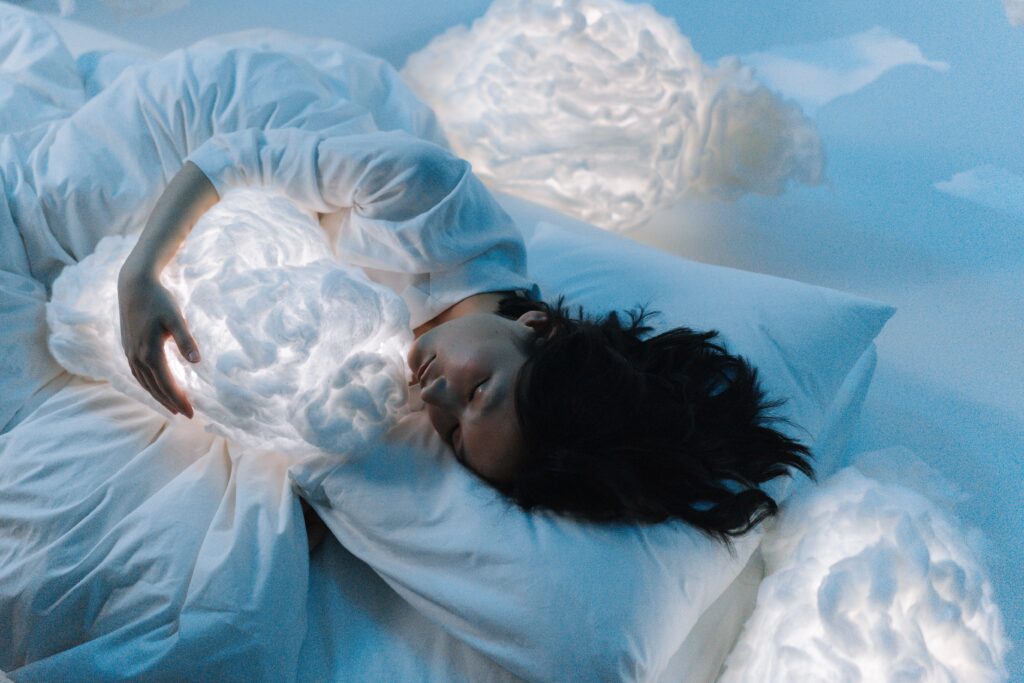
Using sleeping medications
“The general consensus is that sleeping medications should be a last resort after trying other strategies. Addressing sleep hygiene is a good first strategy,” said Dr. Kriebel-Gasparro. CBT is another common non-pharmaceutical treatment that has shown good results among older adults. [13]
Melatonin is a naturally occurring hormone in the body that promotes sleep and can be taken as a supplement, but Dr. Kriebel-Gasparro recommended talking to your doctor about whether it’s safe for you to supplement with it. “Melatonin levels go down with aging and small doses (between half a milligram to three milligrams) are best unless recommended otherwise by your doctor,” she said. “Many older adults use melatonin with good effects.”
Melatonin supplements are generally safe, but there are some health conditions that can be negatively impacted by melatonin supplements. Your doctor can advise you.
In certain populations, there are indications for sleep medications, like those diagnosed with Parkinson’s or Alzheimer’s disease, according to Dr. Kriebel-Gasparro. “This should be under the care of a physician, psychiatrist, or psychiatric nurse practitioner who can diagnose and safely prescribe medications for sleep,” she said.
If you suspect that your medication regimen is contributing to poor sleep, talk to your doctor, said Ridge. “There are certain medications that can be rearranged because they can cause a problem with your sleep patterns.”
Start sleeping better and safer
Not sure where to start? Print our Sleep Packet and start keeping your sleep diary, documenting each day honestly and completely. “If you have concerns about your sleep, be sure to speak to your provider for recommendations on lifestyle changes, medications, or supplements that can help you get quality sleep and improve your brain health,” said Dr. Kriebel-Gasparro.
This article is republished with permission from the National Council on Aging.

